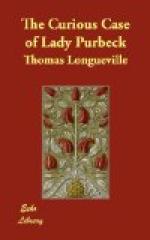In Sir Edmund Withipole’s house Lady Elizabeth and her daughter lived in the strictest seclusion, and all precautions were taken to prevent the place of their retreat from becoming known. And great caution was necessary, for Lady Elizabeth and Frances were almost within a dozen miles of Stoke Pogis, their country home; so that they would have been in danger of being recognised, if they had appeared outside the house.
But Lady Elizabeth was not idle in her voluntary imprisonment. She conceived the idea that the best method of preventing a match which she disliked for her daughter would be to make one of which she could approve. Accordingly she offered Frances to young Henry de Vere, eighteenth Earl of Oxford. Although to a lesser extent, like Sir John Villiers, he was impecunious and on the look out for an heiress, his father—who was distinguished for having been one of the peers appointed to sit in judgment on Mary, Queen of Scots, for having had command of a fleet to oppose the Armada, for his success in tournaments, for his comedies, for his wit, and for introducing the use of scents into England—having dissipated the large inheritance of his family.
Undoubtedly, Lady Elizabeth was a woman of considerable resource; but, with all her virtues, she was not over-scrupulous; for, as Lord Campbell says,[14] to induce her daughter to believe that Oxford was in love with her, she “showed her a forged letter, purporting to come from that nobleman, which asseverated that he was deeply attached to her, and that he aspired to her hand.” Lady Elizabeth was apparently of opinion that everything—and everything includes lying and forgery—is fair in love and war.
FOOTNOTES:
[11] Chamberlain, in a letter dated 22nd June, 1616.
[12] A quotation given by Lord Campbell (Vol. I., p. 297); but he does not state his authority.
[13] Arthur Wilson, in his life of James I. (Camden, History of England, Vol. II., p. 727), tells the following story about Sir T. Compton whom he calls “a low spirited man.” “One Bird, a roaring Captain, was the more insolent against him because he found him slow & backward.” After many provocations, Bird “wrought so upon his cold temper, that Compton sent him a challenge.” On receiving it, Bird told Compton’s second that he would only accept the challenge on condition that the duel should take place in a saw-pit, “Where he might be sure Compton could not run away from him.” When both combatants were in the saw-pit, Bird said: “Now, Compton, thou shalt not escape me,” and brandished his sword above his head. While he was doing this, Compton “in a moment run him through the Body; so that his Pride fell to the ground, and there did sprawl out its last vanity.”
CHAPTER IV.
“There
is no such thing as perfect secrecy.”
—South’s
Sermons.




